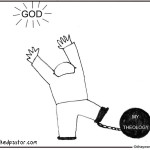We run our website the way we wished the whole internet worked: we provide high quality original content with no ads. We are funded solely by your direct support. Please consider supporting this project.

Theology and Imagination
The human brain is by far the most amazing, complex, and mysterious aspect of the physical world. Our brains continually interpret our world, and the way we interpret it is mostly determined by the way aspects of our world trigger our imagination. Our imagination encodes messages and creates feelings, and thus motivates behavior. And most of this goes on in our brains without any conscious awareness of it.
When our imaginations see truth in a way that corresponds to the way things actually are, and when they evoke appropriate feelings to motivate us to behave in effective ways, the imagination is a great ally. In other words, when our imagination corresponds with truth, we are able to experience the things of God as real and are transformed by this experience. However, what God intends for good, the enemy indents for evil. In a fallen world, we go through experiences that shape our imaginations and cause us to interpret the world in ways that don’t align with the truth.
One of the most pervasive problems in contemporary Western Christianity is that we mistakenly assume that theological information automatically translates into transformation. We tend to have a naïve conviction that if only we read another book or join a Bible study or take a class that we will be changed.
Western Christians have forgotten how to use the imagination with regard to spiritual matters. Most of us only know God with our intellect, not our imagination. For many, faith is little more than intellectual assent to certain propositions and a commitment to live in a certain way. We tend to equate the imagination with fantasy and make believe, and therefore we have come to mistrust it, especially in spiritual matters. So our imaginations, the way we see and interpret ourselves and the world, continues to reflect more the pattern of this world rather than conformity to Jesus Christ.
If our faith is going to be powerful and transformative, it is going to have to be imaginative and experiential. St. Ignatius, founder of the Jesuits, wrote, “It is not knowing a lot but grasping things intimately and savoring them that fills and satisfies the soul.” Memories shape us profoundly because we grasp them and savor them not as information but “intimately.” This is the manner in which we need to embrace our faith, and our theology, if it is to satisfy our souls and transform our lives.
It’s a wonderful thing to confess theologically the claim that God is love (1 John 4:16), but this information will not significantly impact us until we can intimately grasp and savor the truth that God loves us individually. So too it’s a wonderful thing to confess the theology that Jesus died for the world (2 Cor 5:14-15), but this information will not significantly impact the way we experience ourselves and the world until it becomes vivid, experiential, and personalized. I need to be able to savor in a concrete way the truth that Jesus died for me, that he loves me to this unfathomable degree, and that I am completely forgiven. This moves theological truths from mere information to my imagination.
—Adapted from Seeing Is Believing, pages 71-80
Photo Credit: Yoosun Won via Unsplash
Category: General
Tags: Imagination, Prayer, Theology
Related Reading

How to be Transformed
We are transformed as we gaze upon the beauty and glory of God. Paul put it this way, “And we all, who with unveiled faces contemplate the Lord’s glory, are being transformed into his image with ever-increasing glory, which comes from the Lord, who is the Spirit.” (2 Corinthians 3:18). This occurs as we cease…

How can prayer change God’s mind?
You’ve argued that since God is all-good, he’s always doing the most he can do in every situation to bring about good. But you have also argued that prayer can change God’s mind. How are these two beliefs compatible?

Lighten Up: Ball and Chain Theology
Let’s not allow our theology to keep us from encountering one another in meaningful ways.

If the violent depictions of God in the Bible are not completely accurate, isn’t all of Scripture up for debate?
Question: I’m very intrigued by your cruciform hermeneutics and can’t wait for your book (Crucifixion of the Warrior God) to come out. But I have to say that it strikes me as dangerous. You’re basically saying that the violent portraits of God in the OT are not completely accurate. But doesn’t this place us flawed…

Some Questions a Year After Her Child’s Death
Jessica Kelley wrote a post for The Jesus Event that we wanted to share with you. You might remember that last year we were getting to know Jessica as she lost her four year old son Henry just before Christmas. In this post, she reflects on the theology of the people around her concerning her son’s death. She has…

